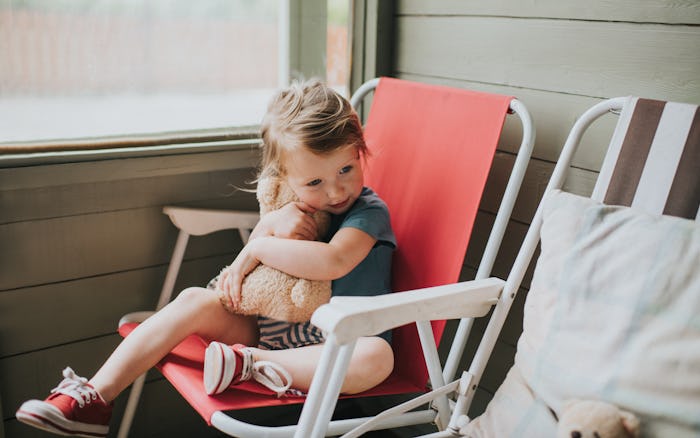Life

My Kids & I Are Really Missing Hugs & Experts Say That's To Be Expected
The coronavirus pandemic has brought about an abrupt onslaught of changes to people's everyday lives. Namely, physical touch is limited to only members of your immediate household, so it isn't a stretch to wonder why people miss hugs right now. Sure, you can hug your child, hug your partner, or hug your dog, but what about hugging a friend? Your child hugging their teacher? What is it about hugs that people miss so much?
Dr. Sarah Hornack, a clinical psychologist at Children's National Hospital, tells Romper that she has seen first-hand how this pandemic has created a longing for the physical touch that was once a normal part of our day-to-day lives, specifically for children. "A number of my patients have noted that they miss seeing and hugging friends and teachers, even when they receive hugs from family," she says. "Hugs communicate, in a straightforward way that children can understand, that one is accepted and cared for. They miss this way of connecting and building social bonds with others that cannot be achieved through virtual means."
But, it isn't just children who miss hugs. People are going to great lengths to hug loved ones safely right now. You've likely seen a viral post or two about grandparents hugging grandchildren through plastic barriers or the woman who wore a hippo suit to hug her family member in a nursing home. Although it seems like a lot to go through for just a hug, experts agree that hugs do an awful lot for a person's mental and emotional health.
"Physical touch is one of our most important social cues," child and adolescent family therapist Darby Fox, LCSW, tells Romper. "It signals our nervous system we are safe, comfortable, and being heard. the neurotransmitter oxytocin is released when we are touched, and that has a calming effect on our bodies. Oxytocin also lowers our cortisol level, and cortisol is the chemical correlated with stress."
In 2018, the United States Census Bureau reported that 35.7 million Americans live alone. Just thinking about the lack of physical touch those people have experienced during lockdown restrictions makes my heart ache, so I can only imagine what it is like actually living without a hug or a loving touch for months on end.
Dr. Hornack explains that hugs "breed warm feelings that combat loneliness," which people who live alone would normally get from interaction with people outside of their immediate household, but now cannot. "We release muscle tension and relax when hugged by our loved ones, and studies show that hugs can lead to greater resilience when faced with stressors," she says. Basically, we could all use more hugs right now, but the reality for some is that this form of physical touch is currently non-existent.
As a mom who feels touched-out on a regular basis, my gut instinct was that I don't "miss" hugs. But in reality, I do. I truly do miss hugs. I did not get to hug my son's teacher on his last day of school to show my appreciation for a crazy year filled with hard work. I haven't hugged my last two living grandparents in months. So yes, even though I can hug my kids and my husband, I still miss hugs with others.
Your kids have likely experienced this same feeling despite hugs from their parents and siblings. Dr. Sanam Hafeez, Psy.D., a neuropsychologist in New York City, tells Romper that children in particular were not mentally prepared for the "necessary, but abrupt" changes we have all experienced.
"While hugs from parents, siblings, or other loved ones are important, children are carrying with them the desire to see their friends and teachers again," Dr. Hafeez explains. "The point isn’t that the teacher’s hug is more valuable or more comforting than mom’s, but that hug represents a return to normalcy that both adults and children alike are hoping to return to as soon as safely possible."
While the time for sharing a hug with those who don't live under the same roof may feel light years away, it will hopefully happen at some point in the near future so that we can once again continue to reap the benefits of a shared physical connection.
"Humans are social beings and rely on connection to thrive," Dr. Hornack says. "A hug, handshake, or pat on the back can help us to feel a sense of belonging and these gestures convey support. If you think about it, our first instinct when we see someone in distress is to reach out and embrace them. It is a silent, powerful way of saying, 'I’m here; you’re not alone.'"
For now, a virtual hug or socially-distanced wave will have to suffice. They may not pack the same punch as a full on person-to-person hug, but in the midst of these trying times, something is far better than nothing.
Experts:
Sarah Hornack, Ph.D., clinical psychologist at Children’s National Hospital
Darby Fox, LCSW, child and adolescent family therapist practicing in New York
Dr. Sanam Hafeez, PsyD., a neuropsychologist in New York City, faculty member at Columbia University
This article was originally published on